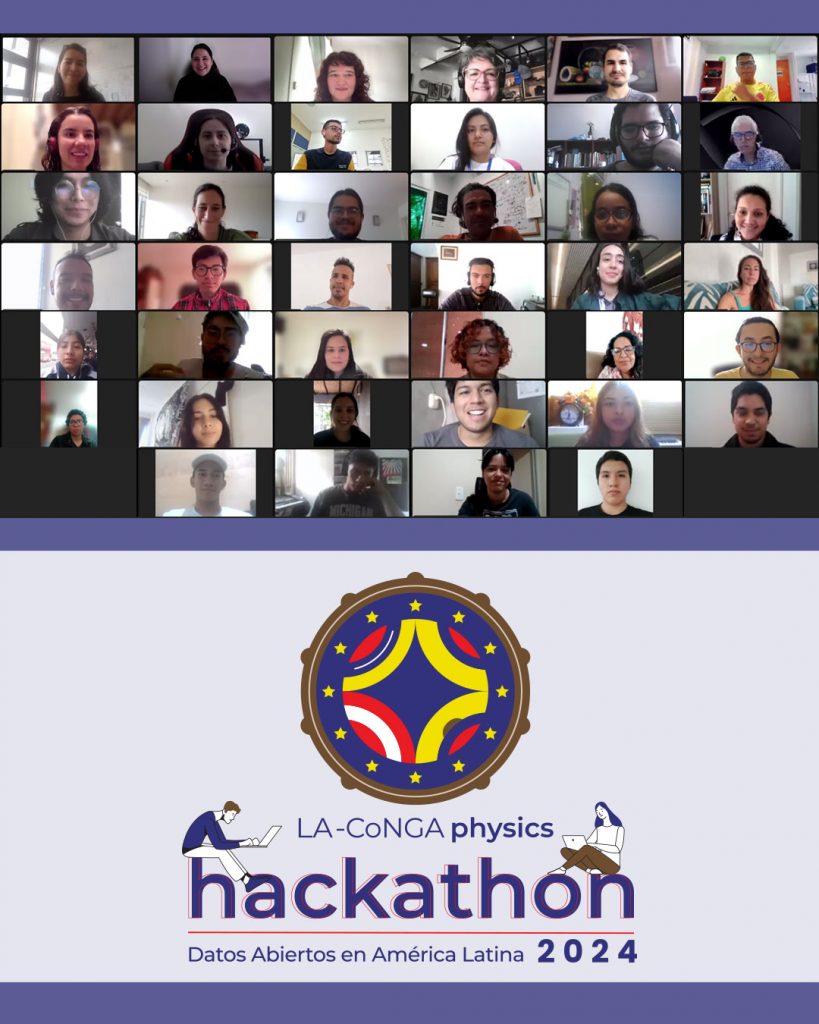by Ysabel Briceno

Migration and Xenophobia, microplastics, public domain works and wetlands were the four major social impact themes tackled by the winning teams of CoAfina, the Latin American science and education hackathon, held on 19, 20 and 21 July. They convinced the judging panel by the quality of the solutions proposed using open access data. In this third edition, the podium was made up of students from seven universities in Venezuela, Ecuador, Colombia and Peru.
Eighty students from more than forty universities in Latin America dared to form multidisciplinary and multicultural teams to remotely solve one of the twelve challenges proposed in different scientific and humanistic areas of social impact, presented by professionals and researchers from different parts of the world. CoAfina thus achieves its mission: to create communities in Latin America and train new generations around knowledge and open data. See the challenges presented in the third edition of CoAfina, here.
The first place was awarded to the team called “Función Delta Pizza“, made up of four physics students from the Universidad Centroccidental Lisandro Alvarado in Venezuela: Adriana Araña, Dalia García, Víctor Sánchez, and Bárbara Guanipa, who gave a solution to the detection of negative topics and discourses presented in the news of Colombian newspapers about Venezuelan migration. This challenge was presented by Mairene Tobón, a member of the Entre Dos Tierras Foundation in Colombia.
Second place went to the team “Neotropical 2.0″, made up of students from the Universidad Simón Bolívar, Universidad de Los Andes and Universidad Central de Venezuela (Venezuela); and the Escuela Superior Politécnica del Chimborazo, in Ecuador. The areas of study of the participants in this team were: biology (Emilio Toledo and Rubén Niño), physics (Andrés Caña and Cristian Usca) and anthropology (Isabella Sánchez). This team convinced the jury with their solution route for the citizen classification of microplastics, a challenge presented by Marga Rivas from the University of Cadiz (Spain) and Iskya Garcia from Creative Commons Venezuela.
Third place was awarded to the “Book Finders” team, made up of four Venezuelan students from the Universidad de Los Andes, Universidad Nacional Experimental del Transporte and Universidad Central de Venezuela, in the areas of physics (Reinaldo Díaz, Juan Martínez and Richard Brito) and engineering (Anibal Pico). This team focused its solution on the idea of optimising a Venezuelan search tool for public domain works, scalable to other countries, a challenge presented by José Luis Mendoza from the Latin American Centre for Internet Research in Venezuela.
Finally, the team called “Data Fixers” received a special mention for the solution to the idea of citizen recognition of wetland transformations in Colombia, a challenge presented by Alejandra Melfo and Yelitza León, from the Universidad de Los Andes (Venezuela) and Óscar Altuve from the Universidad Simón Bolívar de Venezuela. This team was made up of two systems engineering students from the Universidad Autónoma de Bucaramanga (Colombia): Adrián Parra and Luis Jaimes; a physics student from the Universidad Nacional de Trujillo (Peru); and an electronic engineering student from the Universidad Nacional de Ingeniería (Peru).
David Sierra, professor at the Technological University of Bolivar (Colombia), who proposed two challenges at CoAfina 2024, expressed his satisfaction with the enthusiasm and creativity that the teams brought to their proposals: ‘I am amazed by the agility of these students from all over the Americas, by the willingness they have and the ideas they generate as a team,’ said Sierra. For her part, Iskya García, a challenger and member of the CoAfina organising committee, explicitly congratulated all the teams for their commitment to accepting something that transcends their area of expertise and described it as an expression of taking on a role as an agent of change in Latin America.
Finally, Reina Camacho, researcher at the French National Research Centre (CNRS) and one of the coordinators of CoAfina, underlined the capacity of the new generations in Latin America to actively participate in practices that constitute different ways of doing science: ‘We are excited to know that some of the challenges that have been solved in these three editions can become prototypes to be developed in the medium term, with the participation of the community that joins in CoAfina’, an initiative that has already compiled some twenty challenges in the use of open data and that can become examples to be replicated in Latin America.
The awards ceremony culminated with a thank you to the organisations that have been strengthening the sustainability of this initiative. CoAfina is co-organised by LA-CoNGA Physics in collaboration with Creative Commons Venezuela, RedCLARA and the Academic Network of Ecuador (CEDIA). This edition was funded by the Open Research Funders Group (ORFG), inait.ai, the Software Sustainability Institute (SSI) and the Open Life Science (OLS) organisation. ‘See you at the next edition’ was the promise of this community that is growing every year.

Leave a Reply